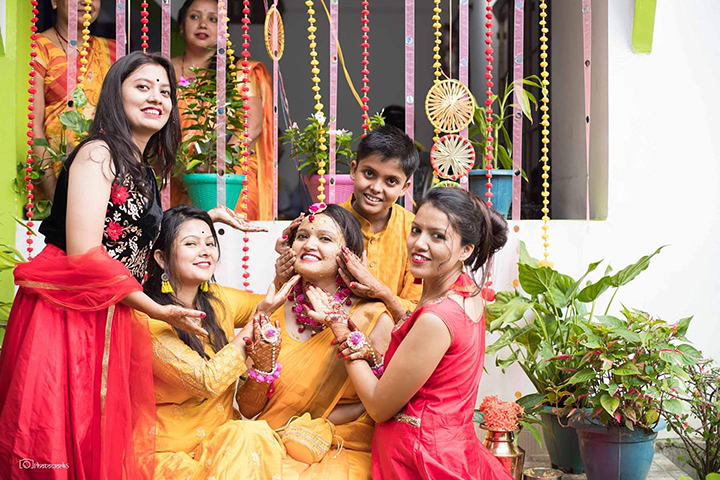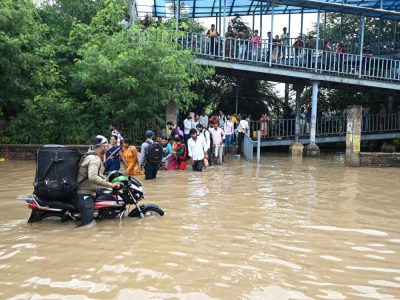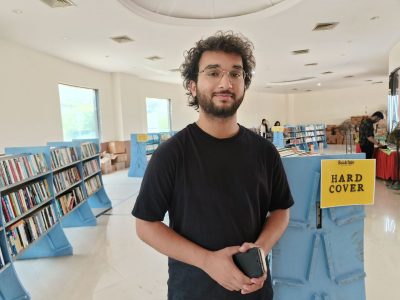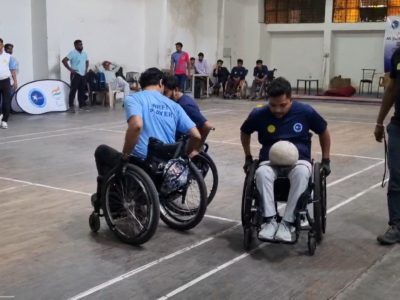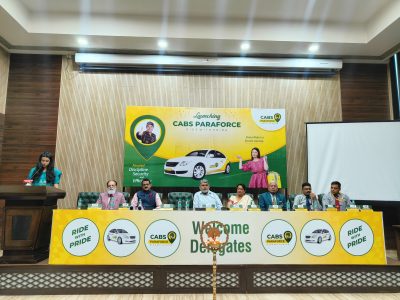Four sisters hailing from a small village of Parbatipur, Jagun, in Assam have started hogging the limelight for triggering the social change in terms of educating girls and empowering women
On June 15, a young woman who is under institutional quarantine at Digboi India Club in Tinsukia district, Assam, sent out an SOS on Facebook after authorities concerned failed to shift a suspected Covid-19 patient to hospital in time.
The Facebook post by Namita Sharma, the third daughter of Abhi Chandra Sharma and Radhika Sharma hailing from the small village of Parbatipur in Jagun, was quite alarming as it pointed at serious lapses including delay in testing after collecting swabs, and lackadaisical attitude of some officials while dealing with positive cases.
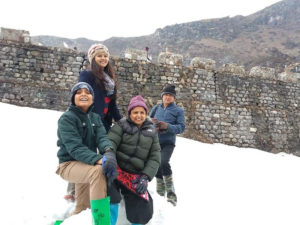
She, along with her eldest sister Chalmaya Sharma, the latter’s husband and father in law and the youngest of the sisters Arati, were under institutional quarantine on their return to their home state from Delhi. After the swab test results got delayed by 11 days, they were informed that one elderly person among many who were quarantined has been tested positive, but with a remark that it was a doubtful case and needed to be reaffirmed.
The man, however, was asymptomatic, and a ruckus followed at the quarantine centre when authorities tried to shift him in an ambulance along with another Covid-19 patient who was severely ill and showing all symptoms. “There were a lot of reports of mistakes in the test results, and as he was asymptomatic, we didn’t want to take a chance. So we requested for another ambulance for him,” says Namita.
But, the officials in charge of the quarantine centre did not heed to their demand and some local TV news channels mistook the confusion as a refusal on the part of the suspected patient to get admitted to the hospital. It was then that eldest sister Chalmaya faced the media to explain the situation and to criticise the mismanagement and the delay in getting the results of such crucial tests. The video of her speaking on how their lives including that of health and sanitation workers were put under threat was shared by many on Facebook.
Namita had no other option but to send out the SOS when the quarantine authorities continued to ignore the suspected case despite a promise of sending another ambulance which they had made later after the commotion. Apart from her cry on Facebook, she tweeted an SOS tagging the Prime Minister, the Union Health Minister, the Assam Chief Minister and the state health minister. Adding on to the trauma was the verbal abuse she had to suffer from the personnel at the quarantine centre whom she approached to know who the officer-in-charge was.
Then, Chalmaya succeeded in getting the Additional District Commissioner over phone and they came to know that the officials in charge of the quarantine facility had lied to the ADC, saying that there wasn’t any positive case at the centre. Finally an ambulance took the patient to Tinsukia Civil Hospital after eighteen hours of traumatic experience.
‘Gautamor Suwali Ki Joni’ or Gautam’s Girls
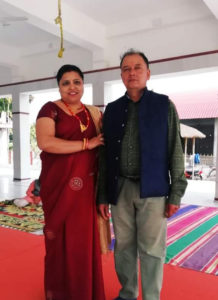
Namita’s and Chalmaya’s strong resistance and fight against the officials’ negligence, which became the talk of the district, was enough to suspect that there was more to these sisters than what meets the eye. And, a quick inquiry found that they were already a great inspiration for the whole village of Parbatipur in Jagun and torchbearers of social changes especially when it comes to empowering women in the entire district.
Admiringly called ‘Gautam’s Girls’ – Gautam ka chori haru (in Nepali), Gautamor suwali ki joni (in Assamese) as their father Sharma is popularly known as Gautam-da in the village – they are four sisters including Chalmaya (Rupa for the villagers), Sunita, Namita (Puja) and Arati and have an young brother, Pukar, who is a student of class 8.
The sisters became famous across Jagun as they pioneered in attaining higher education, despite being born to a couple who unfortunately couldn’t attain education due to their circumstances. Though the villagers were becoming suspicious and raising their eyebrows for breaking conventions, Sharma and his wife were determined to ensure good education for their girls.
Mr Sharma remembers how they had toiled to build a house and to provide for the family. “I started as a peddler of small goods, and often found business at the Bihu celebration venues. With my earnings, I built a ghumti (a tiny shop made of wood and other raw materials) that sold pan and other small articles. My wife kept hens at home and grew some chilly and bananas and we managed to get our eldest daughter admitted in an English-medium school.”
When asked what gave her the strength to carry on with educating her daughters amidst the discouragement, Mrs Sharma said she never got to do the things she wished to do because of lack of education. “I didn’t want a similar fate for my children. I wanted them to be independent.”
Now, the ghumti has been replaced by a pukka retail shop known all over Jagun, just like his daughters. The childhood of all of them was shaped around the shop, as everybody helped out since they were very young. All the kids attended schooling at St. Vincent’s High School, Jagun, an English-medium school nearby to their house.
Chalmaya was the first girl in the village to go outside the village for higher studies, starting with her Junior college days at Dibrugarh, and then to Delhi University from where she did her Bachelors and Masters in Psychology. She also became the first person from her village to teach in Delhi University, when she joined as Assistant Professor in Indraprastha College for Women, for which she was felicitated by a local youth organisation. Now, after her M Phil, Chalmaya stands as the only licensed clinical psychologist in Tinsukia district.
The second daughter, Sunita works in Alzheimer’s and Related Disorders Society of India’s Guwahati Chapter as a Psychologist, and she is helping out elderly suffering with dementia. The third, Namita did her graduation in Delhi University in Political Science and pursued post- graduation from Pondicherry University, making her one among the first persons from her village to go south of the country for higher education. Arati, the fourth, studied BCom from Guwahati Commerce College, and she wants to pursue post-graduation in Marketing or Human Resources.
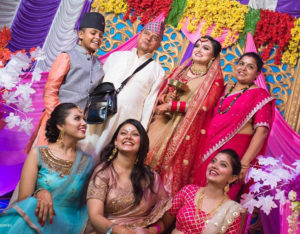
Chalmaya Sharma says it wasn’t easy being the eldest child and the first one to experience the road not taken in Jagun. “Many people tried to make me feel guilty for my education, as they portrayed it to be only a burden on my father. But, with my life I have shown that it was not just sons, but daughters could also contribute to the family in all ways, most importantly financially. This was important, as I was proving the people who thought that educating girls was a bad investment that they were wrong, and they saw me even taking my family to a trip to Sikkim by air.”
She knows that the villagers are gradually transforming. People who tried to discourage the sisters are now seeking their guidance for their own sons and daughters. The village is now witnessing young girls opposing early marriage and asking to be sent out for higher studies. “Their mindsets have changed since they saw us girls contributing financially to build our house. We are all happy that many girls in the village follow the example set by us, Chalmaya points out. To her happiness and surprise, an old aunt who was their neighbor, opined at her wedding: “Gautam did a good job. He let them fly.”
Raising Girls’ Self-esteem
Chalmaya wishes to engage further with the village and its girls through awareness campaigns and constant dialogue about gender, education, mental health and creating a space for self-esteem for girls, while Sunita wants to start a business, preferably a wedding hall. Namita wishes to pursue a PhD, but is planning to form a club to cultivate a participatory political culture in her village, and to keep pushing uncomfortable questions concerning the caste system, religion and gender along with irrational traditions. Arati, already equipped with the business skills earned from her helping out at her father’s shop after all her sisters left, dreams of owning her own enterprise one day.
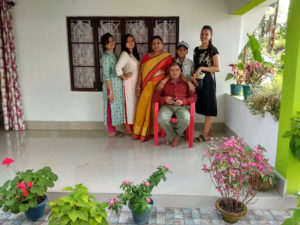
The luckiest one seems to be Pukar, their younger brother, who have grown up in the midst of and under the guidance of these amazing women. When asked what he thought about his sisters, he listed out the reasons why he loved them so much. “It was because of Maya-di that I started reading. Sunita-di pampers me with chocolates. Puja-di gives me motivation boosts and Arati is my childhood companion,” he beams.
Mrs Sharma is more happy and proud than ever, and she is respected more by her peers owing to her daughters’ success and for her role that made all this happen.

To ease the stress that three of her daughters and the in laws are facing, she had prepared their favourite dishes with the help of Sunita, and had dropped off at the quarantine centre a day after the commotion. Curiously the man whom the officials tried to shift along with a Covid-19 positive patient in ambulance tested negative later. So too the Gautam girls, who are now back home with family.
(Cover:The sisters with Pukar)

